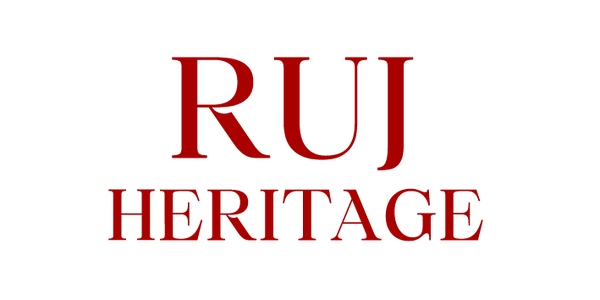
"HONEST LUXURY"
Share
Is "Green" the new Black?
If ethical shopping used to mean buying fair trade coffee or cruelty-free makeup, today the best eco-friendly purchases are in fashion. Today, knowing where your clothing comes from is incredibly cool.
Making eco-sustainable fashion means working in a protected supply chain, aimed at minimizing waste, pollution and exploitation of workers, because "sustainability" is not only ecology, but also concerns the social aspect of production.

"Buy better"
In recent years, more and more Italian brands have been born with the title of "sustainable fashion brands", whether for purely commercial or ethical reasons, sustainable fashion is finally a reality.
Ruj Heritage believes it is important to make consumers understand the philosophy of "Buy Better" with social and environmental ethics.
In its small reality Ruj is committed to the research and selection of first quality fabrics and leathers found in warehouses and stocks throughout Italy with the aim of reducing waste in the fashion system and recycling the raw material by reintroducing it under a new design back into the market, contributing to alleviating global pollution. Furthermore, limited production is a choice of this brand to always alleviate pollution: producing little and well, avoiding waste and inventory. Therefore enhancing the article of an exclusive uniqueness.
"Sustainability" is above all a philosophy, a culture, a history: choosing a sustainable and Italian product means buying something unique that has all the flavor of the most beautiful Italy, thus giving an important contribution to our economy, ensuring that large, but above all, small companies continue to develop.
It is important to establish a bond that goes far beyond the simple sale of a product, but is based on common moral values.
The power of vintage and second-hand: luxury with "green hues".
It is widely known that fashion is one of the most polluting industries in the world. An estimated 120 billion new garments are purchased each year. Fashion resale companies are helping to combat this, and are growing exponentially, and the items they resell will save the planet exorbitant amounts of euros in environmental costs.
A clear indicator of these values is reflected in the rise of resale, celebrated for its true sustainability. Off-season collections, vintage and resell are trendy buzzwords among second-hand shopping consumers, mainly thanks to TikTok, where archival look inspirations from Gen Z and Millennials are not wasted.
With more brands committing to a path towards sustainability, there is still a lot to be wary of, however, as greenwashing is a tempting buzz-generating tool: marketing strategies used to portray a brand as eco-conscious. Greenwashing leads consumers to believe they are supporting a sustainable brand when they are not .

"Honest luxury": Innovation is one of the basic pillars of the journey towards sustainability.
Reusing materials is one of the most important levers that the fashion industry can use to reduce its environmental impact, also called "closed-loop recycling", which consists of limiting the production of virgin raw materials and reducing waste through the cyclical use of already existing materials.
Sustainability is based on the transparency of a brand at the production level, in the analysis of its impacts on production, on the quality of the workforce and, of course, on the ethical aspect. And media power is essential to send a positive message to the consumer: being responsible does not mean forgetting about style and savoire-faire, but it is important to take initiatives for a greener future!
